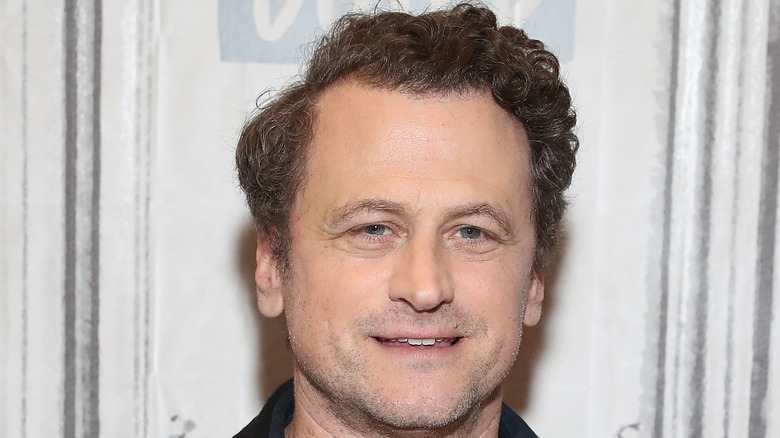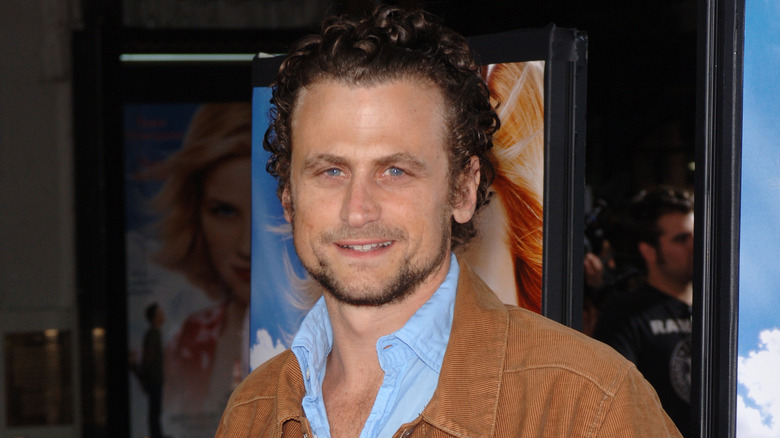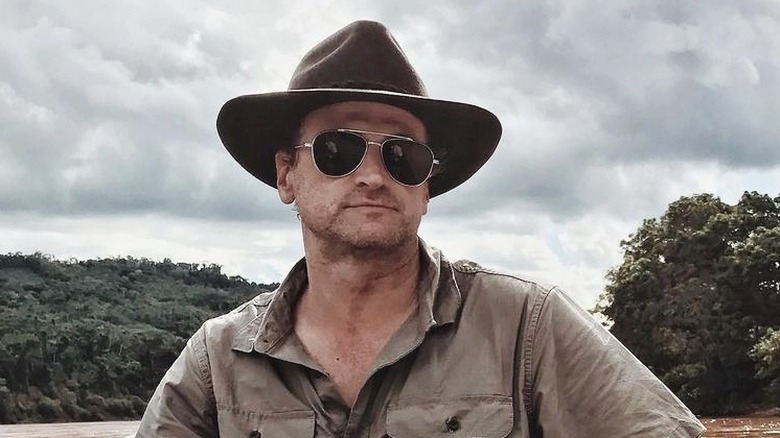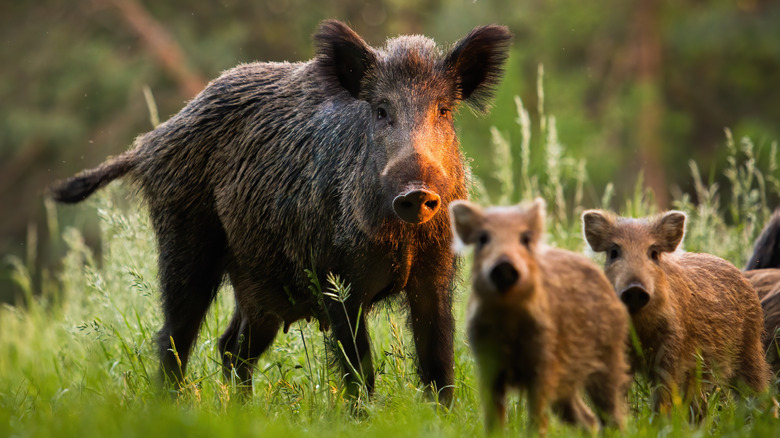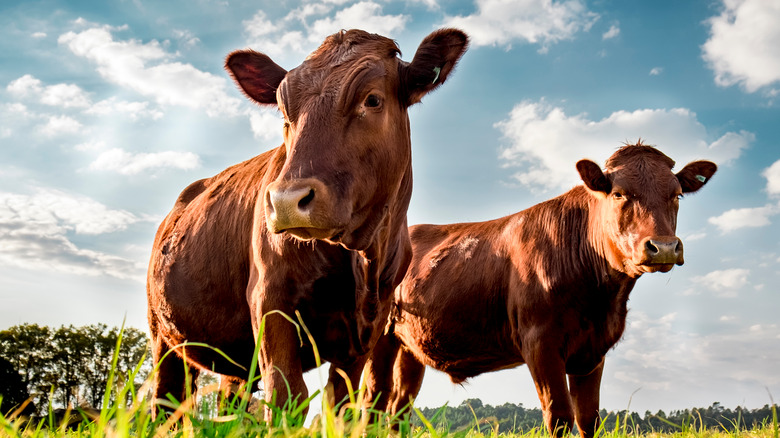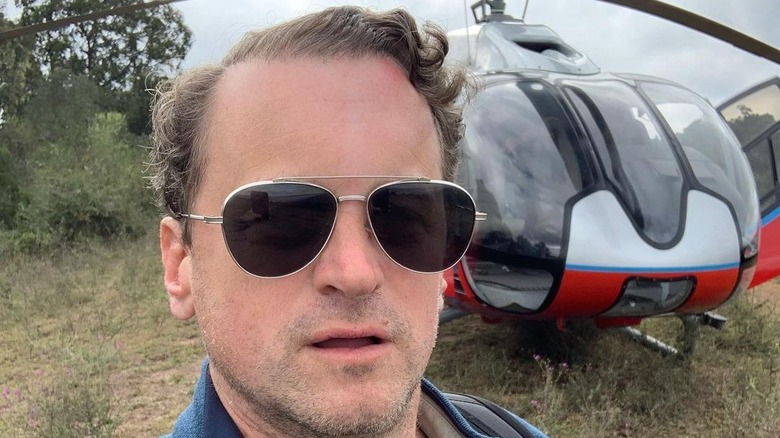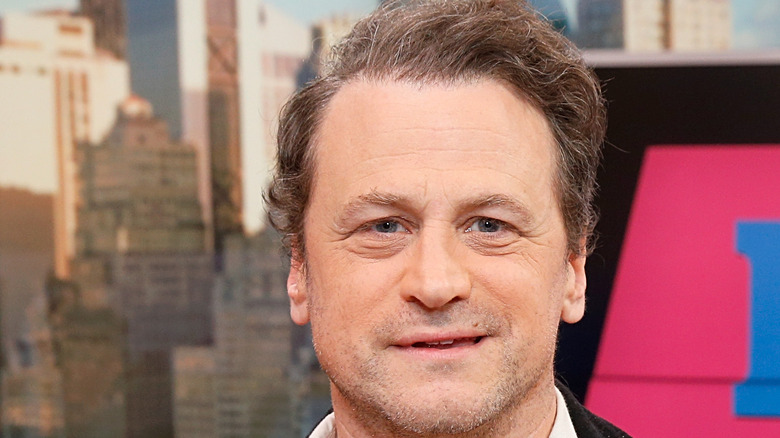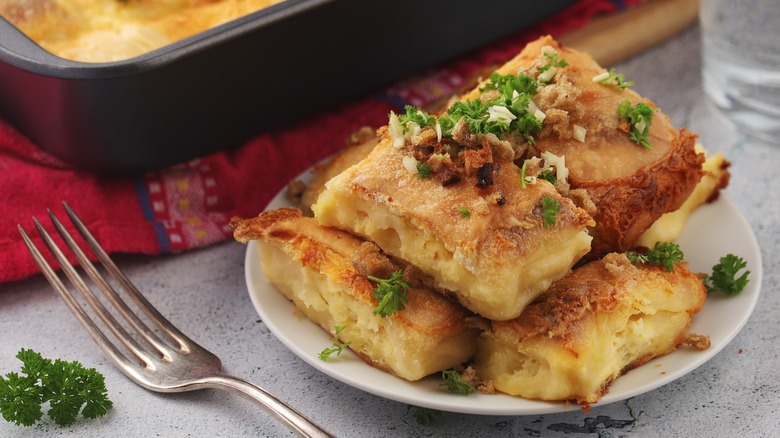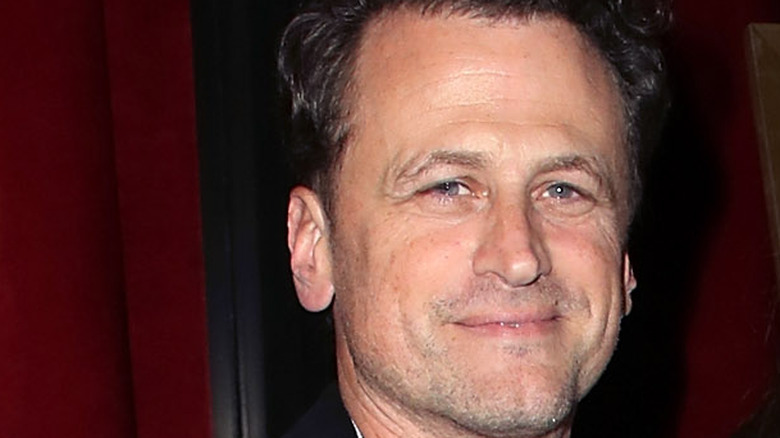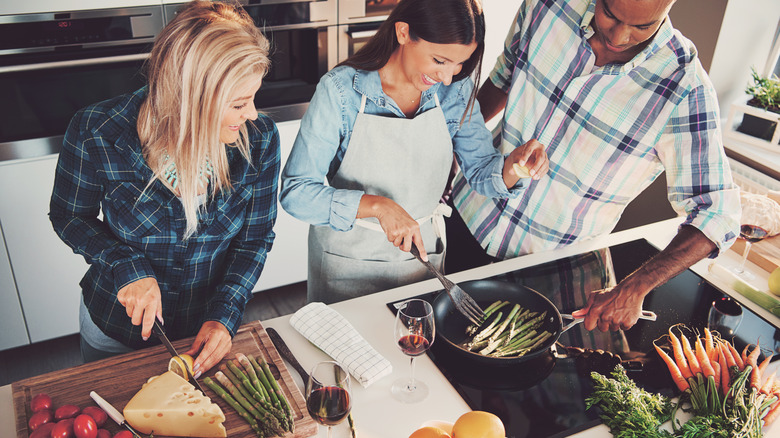David Moscow Tells All About His Show From Scratch - Exclusive Interview
Nobody could have predicted that the cute kid who played young Tom Hanks in the film "Big" would find himself scouring for acorns in a secret location in Utah or hunting for octopus in Sardinia or smoking butter with lamb dung in Iceland. As an actor, David Moscow has appeared in a slew of films, television shows, and theater, but his new role on his show "From Scratch" is like nothing he's ever done before. In an exclusive interview with Mashed, Moscow opened up about his life-changing experiences on the first season of "From Scratch."
"From Scratch" isn't just any food-travel show. Moscow travels to national and international locations where a local chef prepares a signature dish. Moscow's mission is to find the ingredients for the recipe at local farms, forests, or underwater, if necessary, in a week. So if the recipe calls for ricotta, he has to milk the cow and make the cheese himself. Moscow told us that he had become disconnected from where food came from and how and why it was harvested. His journeys on "From Scratch" brought him into close contact with different cultures that don't take food for granted, especially the animals they slaughter for meat.
On the show, Moscow had to kill and butcher several animals, and he still chokes up about it. As a result, Moscow and his family now eat vegan or vegetarian five or six times a week. But don't think that "From Scratch" is a diatribe about eating meat. It's not. The show is funny, enlightening, and even thrilling at times.
How David Moscow created From Scratch
What inspired you to create "From Scratch"?
It was a number of streams that came together at one time. I was about to have a child, and I was thinking back in my life about oh what were all the things I enjoyed doing as a kid, and a lot of them end up being out in the woods or apple picking or fishing with my Grandpa. The things that I had not done in 30 years, and as a city guy in New York and L.A., it's so different. My life is like, "Oh, I'm [meeting] somebody for coffee," or driving over to the Valley. And I said my relationship with my food had become so removed because I wasn't picking strawberries anymore. And that related even to the meat that I was eating. I would get meat that was wrapped in plastic at the local grocery store and cook it, or I would have it served to me at a restaurant, and when you look at it, it doesn't have any relationship to the animal that it once was. And I thought that it was important for me, for my kid, to dive back into this.
And at the same time, it was around 2016, and there was a politician who was going around saying terrible things about Central American immigrants, and I was like, "That's crazy!" ... to villainize our neighbors and family, people who've given us this, who work hard to bring food to our table. Central Americans are the backbone of American food, and so I was like, "Let's do a documentary where I try to make tacos and a margarita." And I go down to Oaxaca and harvest corn and with subsistence farmers there, and then go to Jalisco and make tequila or Mescal, and my agent who also repped [Anthony] Bourdain, and so they told him about the show, the documentary. And he came back and said, "This should be a series. You should follow food cultures around the world, food producers around the world."
And it was the idea, the fact that I wasn't an expert. We have a lot of experts on TV, particularly chefs, but this wasn't going to be about that. This was going to be about the people who brought the food to the chefs. Right? So while we do every episode, when you have to make it as a TV series, come up with the structure. I meet with a chef. They make me a meal. I eat it. It's delicious. And then we go through and say, "Okay, there's corn here. There's pork, there's a pig. There's kale." And I'm going to have to go get this, and I have a week to go do it. Then I bring it all back and the chef teaches me how to make it ... Sometimes I fail. It's hard. I mean, the people I worked with obviously have been doing this their whole lives, and you can see the difference between what someone who is clueless ... versus somebody who's very skilled. And that's one of the things I really, one of the reasons I wanted to do the show.
The first episodes of From Scratch were a little rough
What was the order that you shot the first season? Is it as it was shown?
No, we moved stuff around. I was coming from being an actor who was used to having all my lines written for me. And then to come into this reality space or docuseries space where it was David Moscow talking. The first episodes are I'm still trying to figure out how to be on camera and allow [myself] to be myself on camera because I was so used to being, "Oh, what should I say now?"
And you can feel ... as an actor, you can feel the dramatic moments where they're supposed to be with a comedy or where the drama's supposed to be, and early on I wasn't good, so we kicked those to the end.
The crew did an amazing job, but I was just getting my sea legs underneath me. No pun intended. But I think Iceland, which was our premiere, it was right in the center. I was just realizing oh, who I wanted to be on camera, what I wanted to say, and at the same time, the crew was really clicking. And so that was episode one. ... So we hit Italy just before then, so you had Sardinia and Naples, which were really strong episodes. And then the ones after that were New York and Finland and Texas. And then the earlier ones went to the end.
In Sardinia, why couldn't you catch the baby octopus?
Oh my goodness. Well, it was so cute. The biology of little animals, the cute babies we don't want to harm ... right? So yeah, I just didn't see myself... The way you kill octopuses is not cool any-
How's it done?
Ah, so you take octopuses and you beat them up against a rock or you flip them inside out. Bourdain did it on his show, you bite their brain. You take it, and you bite their brain while they're alive. All of that was not cool for me, not with this little baby one. So no, no octopus that episode.
This was David Moscow's moment of transformation
Tell us about the Mexico episode when you had to kill a pig.
Well, I'm not a hunter. I'd never hunted before that episode ... When you're in the blind with the rifle, there's a distancing thing that goes on. It's almost like a video game ... And you're just trying to accomplish this breath correctly, shoot the target. But as I left the blind and walked across, that's when the waves of emotion came ...
It was almost like cinematic. It was getting dark, and we found her, and she was in the dark in the field, and she wasn't dead. She looked at me with this big eye that was like God's flashlight, like "What have you done?" And the hunter, who was teaching me, he took out his pistol because he was going to finish her. And I was like, "No, this is my job. I have to do this. I got us here." Even though the whole time I just wanted to be removed from what was going on. I wanted to get out of there ...
And it was almost like every negative thought about what was going on, this wild piggy smell, the dirt that was on her, the caked mud, there were these ticks down there. I think they're called Lone Star ticks that if they bite you, you actually can't eat meat after that.
And so pigs are one of the smartest animals, and people raise them as pets now. My father actually stopped eating pork. And they're also one of those animals that we have culturally, collectively as kids from Piglet to "Charlotte's Web" ... So this was a moment of transformation for me. When I shot her, it changed how I eat meat now. I eat it much rarer, much more rarely. I feel like if I'm going to eat an animal, it needs to have been raised humanely, and the people who have raised it need to be paid well for that.
So going from growing up eating breakfasts where there's maybe three or four different dead animals on the table, like chicken sausage and some bacon. I come from a food culture where that's the way it is. My family, my wife's family. And so giving up that completely, giving up your food culture completely is a huge thing.
Also, I enjoy meat, but now that I've killed the animals that I'm eating, I've realized what that means. I could see some period of time in the future, and I'm drifting in that direction anyway, to going vegetarian or vegan, now that it's in my mind. It doesn't need to be the center of every plate. And I'm raising a son, too, [so] I don't want there to necessarily be this huge chunk of meat in the middle of the plate, for health reasons, for moral reasons, ethical reasons. And so yeah ... I'd say we're vegetarian/vegan probably five to six days a week, and then we have our cheat day, our L.A. cheat day.
Slaughtering a cow was an eye-opening experience for David Moscow
In the Texas episode, you had to slaughter a cow?
So, we went down to Texas, and it was a slightly different episode just in terms of structure. In this case, because the slaughter of the cow was so important, we started with just this ingredient, and then we went around Texas to make barbecue from all the different parts of the cow. But we started at a very small, humane slaughterhouse — farm and slaughterhouse. And so the cows are living basically free-range and have good lives right up until the moment. Normally with large factory farming, the animals live these terrible lives and then the last day saves them from that. And in this case, the end for the cow is the worst moment, but they live good lives.
So ... I got in front of the cow, and it was in this pen. And the hard part is that humans anthropomorphize where you put your feelings into that cow. And there was a moment where the cow looked away and looked down, and I took that as "oh, the cow knows what's about to happen." And maybe it did. Maybe it could smell what was going on in the slaughterhouse behind it or maybe not. Maybe it was looking for food. And then we went in. So the FDA doesn't allow us to actually do the stun. There's an air stun gun that goes into the brain, but it's still alive at that point, it's brain dead. At which point, I stepped in to start to kill it and then break it down into the cuts that we all know.
And it was an intense, visceral experience because until it got down into the sides and the cuts of meat that I knew and was comfortable with, you were breaking down a just-dead animal that's still kicking around. You've got to watch out for the hoof. The hoof will come up and get you. First, you're cutting off the head, you're giving the head to the FDA so they can test it for mad cow [disease]. Then you're taking off the hide, which they're going to use, went to a leather maker to process the leather. And that was one of the good things that we learned is every single piece of this cow was going to be used for something. And if it wasn't for human consumption, it went to dog food or cat food.
And so, yeah, you just want to get out of there. You just don't want to do this anymore. But again, this was something I wanted, I needed to do. Right? We did some thumbnail sketches of how many animals I've probably eaten in my life. Forty thousand animals. And that's for an average American, that's basically two animals a day from the age of five until 45. Right? And that doesn't include the all-you-can-eat buffets in Vegas or Italian sandwiches piled high.
And to not have any thought about that because I didn't use the knife or pull the lever or shoot the gun is wild. We are so disassociated from what we're actually doing in the world, and we like it that way ... We want that wrapped in plastic. We want the slaughterhouses in the middle of nowhere, that maybe we drive by and smell on our way to Northern California.
Season 2 of From Scratch will be different
Did your experiences in Season 1 impact Season 2?
So we definitely looked to do more vegetables and plants. One of the hard things is that America is a very meat-centric country. And so how many [people] want to see me go to a garden and furiously pick vegetables? So they like the drama of me being put into situations that cause me distress or to complain. That's what people like to watch.
And so we've been able to lean into things like can I climb a coconut tree and get a coconut? That's as dangerous as trying to harvest octopus. So we lean into making adventure or authenticity around harvesting all types of, whether plants or animals. And I think we lean a little bit into the history now more and talking to the experts now more, which I think putting the medicine in the ice cream is something I've wanted to do from the beginning.
My wife is a co-creator on the show, but she's also the audience. She's who I'm making the episodes for because she's about 10 years younger than me, and her attention span is less than mine. So if her eyes start to glaze over while watching a rough cut, I know okay, we got a little too much medicine in here. We've got to trim that back a bit ... But it means that it's accessible to people, which is what we want. We want people to watch it and learn without feeling like they're being preached to and to learn.
The people who bring our food to our table are heroes as we saw in COVID. COVID totally ripped whatever mask was on this. They were putting their lives on the line for us to get us fed. And we find that they are at the front lines of climate change. We find that they're at the front lines of the economic justice movement. And if there are lots of people that we all agree should make more money, teachers and nurses and food producers, people who work in restaurants, people who harvest in fields or fish for us, they are totally part of that. They are giving us the sustenance with which to live.
David Moscow reveals details about Season 2
What else can you tell us about Season 2?
Season 2 is I think we know what we're really trying to do now. And each one of these places that we ended up going to tells a unique story. We went to Malta. Malta's where Christian crusaders used as a launching pad against the Ottoman Empire, and they basically became pirates. And they were pirates that were licensed by the Spanish government, literally taxed on the piracy that they got. But what I meant was they were going out and getting spices and gold and bringing it back to Malta, and that was the way it was trickling back into Europe. So Malta became this center point of really interesting food culture.
And ... at the same time, [we]really started to see the battle of the water, how the world is running out of water, and Malta is one of these places that they're trying to figure out. Sixty-five percent of the water now comes from the sea that they're desalinating. So yeah, there's really cool adventures. I try and go after octopus again. It was not pretty because of what happened the last time. I kind of had PTSD ...
We traveled to a few places where the ritual of killing has a spiritual component and is obviously extremely important ... We were in Kenya, and we were with the Maasai, and we bargained for a goat. And then we slaughtered it in the Maasai tradition, which was intense. But this is how my host did it, and so I had to go along with it, I wanted to be respectful of their culture, and so we slaughtered the goat the way they did it.
What do you want your audience to come away with?
The pride and the expertise and the hard work that goes behind harvesting sorghum, harvesting wheat, fishing for crab. I mean, these are tough, dangerous jobs. Fishing is the most dangerous occupation in the world. Do we know that? No, I don't know that. ... And there's no real support structure for people. In a lot of places in the world, they're living at near poverty or below the poverty line to feed people. That's crazy. So, I hope that's something that people take out of this.
David Moscow's favorite meals
What's been your favorite meal in all of your travels?
Eating goat stew on a mountaintop in Kenya, how can anything beat that, right? Going to Zagreb and eating a cuisine. I'm Eastern European on my father's side. No idea what any of these dishes are. To go and make food from my ancestry, my culture with this chef. Tvrtko [Sakota] is the best chef in Croatia. And he learned his cooking skills in Japan, so he makes Japanese-style dishes, but Croatian ancestral historical food. So he's making a pork tartar that's almost like nigiri that you're eating with chopsticks. He's taking a Štrukli, which is a ... He could kill me that I say ricotta, but it's like a ricotta cheese ravioli but made like a gyozo, and everything was so incredible with tastes that I kind of knew. There's just bread with cheese in it and a fried dough with cheese in it in a lot of cultures, but not done like he was doing them.
Iceland last year. Scandinavian food's not something I'd eaten very often or hadn't eaten before that, and wow. Fermented fish, not something I have a lot of. And also, places push you to the limits of your own taste. Taste is so specific and so, you can't legislate tastes. It harkens back to some things that your Mom ate while you were even in her belly. You can't determine what you're going to like and not like.
And that's one of the things. I try and go to countries and be very open-minded, but at some point, you've got to be like, "This is horrible. This is horrible." And you have to have been raised eating this as a child. Like rotten shark in Iceland. Oh my gosh, right? I'm very open with that too, trying to be as respectful as possible, but to be like, "This is not for me." So each one has its own. To make tacos, to make a margarita, that's phenomenal.
David Moscow wants you to cook from scratch
It seems that the experience and the food are tied together.
I recommend people do it. Nothing tastes better. When you start to harvest, your taste buds and your hunger, the desire begins then. You walk into a hot house in Naples to harvest plum tomatoes, and that sticky, dank, earthy air, and you smell that tomato, and then you pick some basil, and that sits on your hands. The whole time for the rest, three days after that, while you're waiting to get in there, you mash it up in the jar, you put it in the steamer, and by the time that hot jar comes out of there, you are salivating, you are ready. You open it up, you grab a spoon, and that is one of the best tastes you've ever had.
Three ingredients and unbelievable. So if people would start taking the time, and I guess this is what things like the slow food movement are about. Right? If you take the time to really engage with what you're doing, it tastes better at the end rather than this thing that came to you in paper out of the drive-through window that you're mindlessly eating while waiting to go to the next appointment or whatever. So not every meal can be done this way, but I think it's great for families. It's great for, what an experience to go out. And even if you're going to harvest the deer or a wild boar, if you eat meat, this is something you should do to see how you really feel about it when it's up close and personal.
According to David Moscow, this is how you can cook from scratch
How would you suggest someone begin to make a meal from scratch?
Well, look, obviously apples, this time of year, pumpkins, this time of year. You can always go, there are farms that allow you to milk goats or sheep or cows. So if you wanted to make a pie, or if you wanted to make a cheese, a cheese is very simple. Go and milk an animal, come back, either get some rennet or some citric acid, put it in there, make a ricotta. Those are basics that you could start doing particularly in the fall is a wonderful time with fruits and stuff.
Fishing is something that's pretty easy whether you live on the coast or by a river. And then there are as other people like me have gotten more interested in where their food is coming from, I think there are now hunting and butchering classes that people can take. They can go upstate New York. The guy who took me in Texas is incredible. He has Dai Due, which is an Austin restaurant that's a wild game restaurant. Phenomenal, perfectly Texas, and Jesse Griffiths is the chef, but he also has a hunting and butchering school and has ... some amazing coffee table books that talk about hunting and fishing. So you can sign up for one of those, a weekend of one of those. And that'll put you right. That's where the rubber meets the road.
You can watch a new season of David Moscow's adventures when Season 2 of "From Scratch" premieres on October 31 at 10/9c on FYI.
